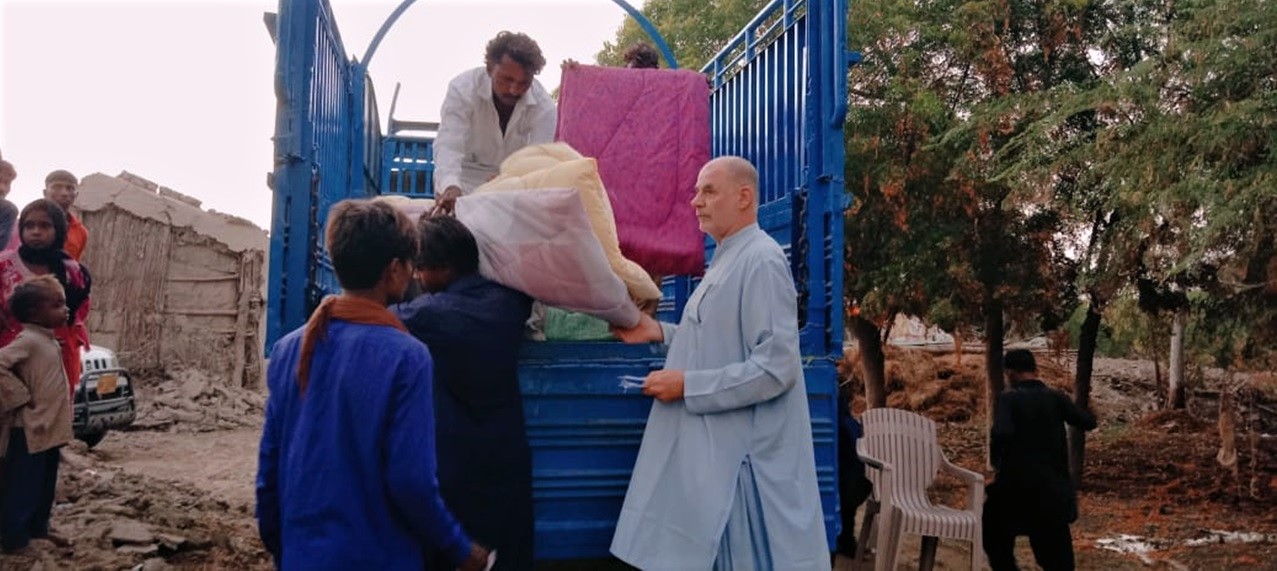
In recent years, my main ministry in Hyderabad is as director of the Joti Centre, the catechetical centre for the diocese, writes Tomás King.
Like all other organisations within the church, as well as NGOs and civil society, the staff of Joti Centre got involved in emergency flood relief in the wake of the flooding crisis.
We are continuing to do this work. This includes distributing food packages, mosquito nets, bedding clothes, organising medical help, and making the Joti Centre available to various organisations so that they can distribute aid.
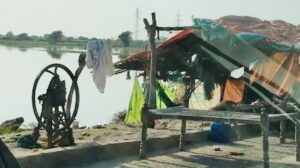 All 17 parishes in the diocese were affected to a greater or lesser degree, and their flood relief response, understandably, focused on the people in their parishes. Joti Centre staff decided to focus on people who fall through the cracks; that is people well off the beaten track and far from the main roads, where thousands upon thousands of people camped.
All 17 parishes in the diocese were affected to a greater or lesser degree, and their flood relief response, understandably, focused on the people in their parishes. Joti Centre staff decided to focus on people who fall through the cracks; that is people well off the beaten track and far from the main roads, where thousands upon thousands of people camped.
Those people who camped on the main roads were more likely to be first to receive relief as they were more accessible. So each day we packed the car with as many food packages and mosquito nets as we could and set out to find families that had not received any aid. As we did so we passed people who we could see had received some aid but who are still in desperate need.
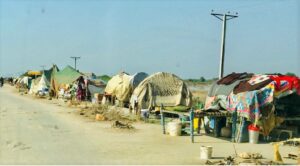 On one such occasion the film ‘Sophie’s Choice’ came to mind, and a hint of the difficult decision Meryl Streep’s character had to make.
On one such occasion the film ‘Sophie’s Choice’ came to mind, and a hint of the difficult decision Meryl Streep’s character had to make.
The situation on the ground continues to be serious for millions of people. There are still thousands upon thousands of people living in makeshift tents on roadsides and other high ground for more than two months. Some have only tattered rags to shield themselves from the scorching mid-day sun.
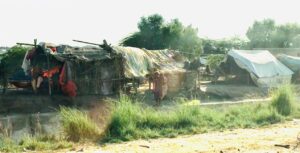 November has come but the mid-day temperature still reaches the high 20s Celsius. Where water has not receded, people are surrounded by pools of stagnant water swarming with diseases and viruses; sometimes metres away from where they sleep.
November has come but the mid-day temperature still reaches the high 20s Celsius. Where water has not receded, people are surrounded by pools of stagnant water swarming with diseases and viruses; sometimes metres away from where they sleep.
The areas still flooded are not primarily from the monsoon rains, but where canals burst their banks, or where they were deliberately breached in an attempt to divert waters from towns and higher populated areas. But this led to the complete flooding of rural villages.
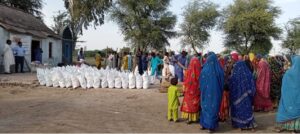 One such village is Roshenabad (meaning ‘place of light’) where 41 families live. 35 years ago, the church bought land and settled the families. It meant they were freed from their landlord’s land and were able to break free from bonded labour. A primary school was also built. It is now a well-established community. The mature trees provide shelter and shade from the heat
One such village is Roshenabad (meaning ‘place of light’) where 41 families live. 35 years ago, the church bought land and settled the families. It meant they were freed from their landlord’s land and were able to break free from bonded labour. A primary school was also built. It is now a well-established community. The mature trees provide shelter and shade from the heat
The village is low-lying and it was also flooded in the heavy rains and floods of 2011. Then, with the help of Columban donors, the village was raised by 4 feet, with soil taken from the church land they were farming. They then rebuilt their mud and brick houses. A German NGO built brick and mortar toilets on the raised ground which have stood the test of time.
This year the mud houses would have survived the monsoon rains, but they could not withstand the torrent of water released when the nearby canal was breached. Thankfully the people got out on time, and moved to the high ground on roadsides, where they lived for the past couple of months.
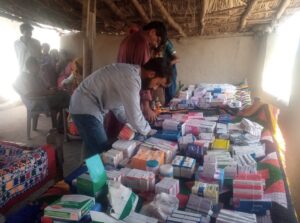 Their village has now cleared of water, so they have just begun to return to where their houses used to be and start rebuilding. And for this they will also need help with building materials.
Their village has now cleared of water, so they have just begun to return to where their houses used to be and start rebuilding. And for this they will also need help with building materials.
Medical Outreach
Since late September a medical team, operating from Joti Centre, consisting of a doctor, two nurses, one male and one female, plus a dispenser are carrying out medical outreach, five days a week, in the rural villages and roadsides of interior Sindh. So far, the average number of patients treated is 120.
The common illnesses are scabies, skin diseases, dysentery, chest, eye and ear infections, as well as gastroenteritis. Malaria is also common, and when the doctor deems necessary, an ‘on the spot’ malaria test is carried out, with the preliminary result known inside 15 minutes. If the test is positive treatment can begin immediately.
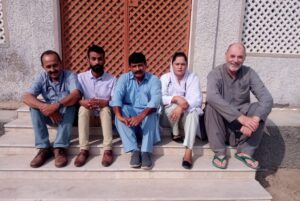
The funds to pay for the flood relief outlined above has come from various sources. These include from donors to the Missionary Society of St Columban, donations from individual Columbans, from parishes in Meath diocese in Ireland, and Colorado in US, and Ba parish in Fiji, plus the Fijian and Tongan diaspora in various parts of the world, who all made collections.
Other donors include Misean Cara, and several religious congregations working in Pakistan, but not ministering in flood affected areas, so they pass on their donations to those of us directly involved in flood relief. Donations also came from Filipina domestic workers, who work here in Pakistan, and Columban students in the Philippines also sent some donations.
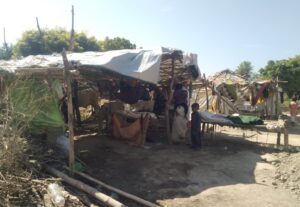 And a special mention to a sponsored cycle that took place over Halloween organized by Paddy Daly and family, raising funds for the floods here, plus for Haiti, where a Jesus and Mary sister and mutual friend works. It is a venture that links Haiti, New Zealand and, Ireland and Pakistan, and friendship that goes back more than 30 years.
And a special mention to a sponsored cycle that took place over Halloween organized by Paddy Daly and family, raising funds for the floods here, plus for Haiti, where a Jesus and Mary sister and mutual friend works. It is a venture that links Haiti, New Zealand and, Ireland and Pakistan, and friendship that goes back more than 30 years.
To one and all, a sincere thanks. Peace and Blessings.
Support Columbans working with flood victims in Pakistan by donating online here: https://columbans.ie/donate/ Alternatively, please send your donation to the Far East Office, Dalgan Park, Navan, Co Meath C15 AY2Y or call 00353 46 909 8275.